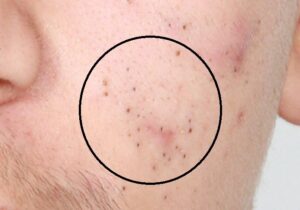
Article by Dr. Shannon Humphrey MD, FRCPC, FAAD
Achieving clear, healthy skin seems like an impossible feat if you have ever experienced blackheads, but it is possible. Dr. Shannon Humphrey, Vancouver dermatologist and spokesperson for the Acne and Rosacea Society of Canada helps us understand what blackheads are, how to treat them and the steps required to prevent their return.

Blackheads, also referred to as “open comedones” are small spots on the skin which surface when oil and dead skin clog the skin pores. When that spot remains closed, a whitehead bump forms (closed comedones). If the spot opens and is exposed to air, it becomes a blackhead. Blackheads appear most commonly on the face, but also on the back, chest, neck, arms and shoulders.
Acne, as we know, afflicts tens of millions in North America, affecting people of all ages and is the most common of skin disorders. Blackheads are considered to be a mild form of this skin disorder.
You’ve probably seen numerous topical (applied to the skin) products at your local drugstore promising clear, blackhead-free skin. Many of these products include active ingredients like salicylic acid, glycolic acid, benzoyl peroxide and retinol. These products work by killing bacteria, depleting the excess oil and helping exfoliate the dead skin cells. Dr Humphrey adds, “Salicylic acid facial cleanser can help to provide a gentle exfoliation and, with regular use, minimize pore congestion, keeping the skin clear.”
You may be tempted to pick, pop and poke to quickly get rid of blackheads. There are better ways so resist the urge. Forcing out the contents of a skin pore can cause scarring and skin trauma — in many cases making the situation worse by causing inflammation and infection. Under certain circumstances your physician may extract contents.
If your first efforts with drugstore topical treatments are unsuccessful or if the blackheads are having a significant negative impact on your quality of life or mood, it’s time to seek advice from a medical professional.
You are not alone — safe and effective treatment options are available.
Sometimes you need a little extra support. For cases of severe blackheads, Dr. Humphrey recommends you speak to your doctor or dermatologist for a stronger topical, prescription medication. These often contain vitamin A (a retinoid). “These work by preventing build up around the hair follicles and also promote a faster skin cell turnover. I’ve seen very reliable results in my practice with the use of retinoids. To use these medications safely, progress should be monitored by your doctor or dermatologist.” adds Dr. Shannon Humphrey.
Oral medications, such as isotretinoin, can be very effective in treating blackheads. This medication requires medical supervision and is only suitable for properly selected patients.
Which leads to the big question: How do you keep your newly clear skin free of congestion?
You’ve fallen back in love with your skin and want to keep the honeymoon going. What’s the secret to success? “There is no secret for maintaining great skin. I tell my patients time and time again to start with their daily skin care. Whatever skin regimen you have, be consistent. I generally recommend a facial cleanser, antioxidant, moisturizer and daily SPF. You may also require a retinol or gentle exfoliating wash containing salicylic acid,” says Dr. Humphrey.
Look at the products you put on your skin. If you are prone to blackheads and pore congestion, opt for oil-free make-up and lotions, and a matte sunscreen. Avoid using dry shampoo as this can contribute to clogged pores and the arrival of blackheads. If you have oily hair, wash it daily.
The war on blackheads is not bleak. There are treatments to help clear up already clogged pores and prevent their return.
About the Author
Dr. Shannon Humphrey is a Vancouver dermatologist and spokesperson for the not for profit Acne and Rosacea Society of Canada. She is Medical Director at Humphrey Cosmetic Dermatology. Dr. Humphrey is a Clinical Assistant Professor and Director of Continuing Medical Education at the Department of Dermatology, University of British Columbia.
Test your acne knowledge. You may be surprised at some of the answers…